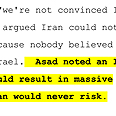
WikiLeaks
The human bug
Op-ed: WikiLeaks affair reminds us that best technology still vulnerable to human action
The accelerated developments in the fields of computerization and energy have deluded us into thinking that we are in good hands; that everything our mind cannot grasp will be worked out via algorithms.
The exaggerated admiration for the power of high technology to manage our lives – shorten tasks, preserve treasures, and safeguard us – stimulates whole economies. For example, Israel’s economy. We have sharp-minded young people with passion and an iPhone , who also enjoy comfortable social and economic conditions, enabling their minds and desire for success to run wild.
The US Administration documents were leaked not because of a technological failure. The algorithms worked as they should have; they even worked overtime, providing the world’s strictest coding and passwords. But someone didn’t take into account that somewhere, at the end of the road, we have people who are full of bugs. And that these people, as opposed to the most wonderful security software, cannot be reconfigured or debugged, and mostly cannot be trusted.
In order to defeat the most formidable security in the world all we need is one person who knows the password and who wakes up in the morning with a direct order from God or from Allah (or who just happened to quarrel with his boss.)
This secret is a simple statistical figure that technology companies have been familiar with for years: Most computer breaches do not stem from “holes” in the system. They are a result of insiders, people from within the system, who cause their damage deliberately or by mistake.
Sweet delusion
Take the world’s most famous hacker, Kevin Mitnick, who was imprisoned in the US for breaking into the networks of large communication companies. More than he was a computer genius, Mitnick was just a nice guy: He used to call key figures at organizations and politely ask for passwords and usernames under various pretenses. Only few people were able to resist his charm.
How difficult it is to wake up from the sweet delusion that technology plays into our hands: It will save us from Hezbollah’s missiles, get rid of Iranian scientists, and in its free time entertain us with the PlayStation. The bitter truth is just the opposite: Our digital environment has great value, but it has nothing to do with values.
The WikiLeaks affair, just like the Anat Kam affair, presents difficult question marks not to computer companies, but to employers and manpower systems in sensitive organizations (and which organization isn’t sensitive?) History teaches us that the writing is always on the wall. The average leaker has a familiar profile: Unstable mental state or family history, ongoing anger and frustration at work, radical ideology, and so on.
So leave the high-tech experts alone. The Internet era requires us to invest immense resources in the humanities and social sciences; in psychologists, historians, social workers, educators, and interior designers. The generation of social networks is desperate for company, comfort, recognition, and harmony; for a good reason to live and work for.
In 2011, a parent or employer who fails to understand this is nurturing with his or her own hands a ticking time bomb at home.
- Follow Ynetnews on Facebook










